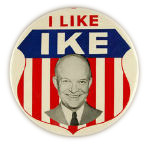Half Greek, Half Latin: Politics !*@!
C.P. Scott, a British journalist, publisher and politician was once quoted as saying: "Television?
No good will come of this device. The word is half Greek and half Latin. "
Some of you might have wondered about the “good” of another device this week: the telephone. Although the origin of the word telephone is completely Greek, prior to the North Carolina primaries on Tuesday, I myself pondered its overall merits. In truth, I was ready to unhook the thing. Hounded by Hillary, barraged by Barak, I actually experienced a sense of relief after seeing the no message light on my answering machine Wednesday evening. Nothing like an election year to make one think about the meaning of the word campaign (especially, a Linguistics geek like me).
Read more
Defending the Empty Vessel Approach to Naming

......................................................................................................................................................................
Maghan Cook, Verbal Branding Associate for Addison Whitney, was recently published in the May 2008 issue of PharmaVOICE. Please click here to view an abstract of her article on Defending the Empty Vessel Approach to Naming.
By: Trista Thielker
Presidential Branding

......................................................................................................................................................................
The Few, the Proud, the Marines. What happens in Vegas, Stays in Vegas. Got Milk? Isn't it amazing how one line of words can galvanize an entire brand personality?
Presidential candidates have been hip to the power of taglines for a while. Here are some goodies:
Read more
No mulligan needed for Wachovia’s event branding

......................................................................................................................................................................
As the Wachovia Championship comes to our home city of Charlotte, NC, I started to think about the event’s effort in branding the Championship, while still keeping the characteristics of the main sponsor’s identity. It is easy to recognize the similarities between the Wachovia logo and the Wachovia Championship logo. Digging further into this, I noticed that Wachovia also has branded a “cycling series,” holding the same characteristics as, once again, the Wachovia brand. So, why is event branding important for large companies to pursue with a keen sense of design?
Read more
Names you can bank on
In an industry as dynamic as banking, names are especially prone to being outgrown. So when an institution realizes its name is not memorable, searchable, or functional anymore . . . well, it’s always changeable.
A fresh identity can provide:
An Umbrella for Growth
In today’s global economy, more and more financial institutions are expanding beyond their original scopes for markets and services, and local names are simply too limiting.
A Simplified Brand
Taking a bland name and giving it a fresh, unique identity.
Merger Marketing
Mergers are very common in the banking industry and retaining the positive brand associations from both previous names can help with an easy transition.
Contributed by: Maghan Cook
Putting Heads…Teambuilding on the Greens

......................................................................................................................................................................
Putt-Putt, why do they name it twice? If the answer is because of how many times you have to hit it to make it in, then in my case, it would be called “Putt, putt, putt, putt, putt...”
Earlier this month, my department took a field trip. This is a new thing for us: a fun, creative voyage that we plan once a month to refuel our creativity by surrounding ourselves with inspiring environments. Our first outing…Putt-Putt. The scenery set the perfect stage to rouse our over-pared creative energy. It was a perfect spring-like day, the birds were chirping, kids playing in the distance, the sound of streaming waterfalls, and us, six women with dreams of being the Tiger Woods of miniature golf.
Read more
Visualizing your Human Footprint

......................................................................................................................................................................
After watching a special on the National Geographic Channel called Human Footprint , I began to think about what it truly means to be a “consumer.” Being a consumer means that we are constantly consuming resources, and as we consume, we leave behind enormous amounts of waste.
On the program, the Human Footprint team very artistically and accurately represents the amounts of food, energy, water and other natural resources we, as individuals, will consume in our lifetime (based on the U.S. average for one lifetime).
Read more
Green: Who Can Claim It?
Remember the greenwashing definition from the last word of the week post. A lot of examples out there, right? Marketers know that consumers are willing to pay a premium for “eco-friendly” products and so many choose to claim that a product is green regardless of its actual impact on the environment. What’s to risk? After all, there is no real regulation of “green claims.” The danger is that, if in the end your company’s products don’t live up to green standards, your brand credibility can, and most likely will, take a hit.
So how do you know if your product is “green enough”? Here’s a great tool I came across when researching the subject on-line. Terra Choice, a North American environmental marketing agency, conducted a survey of products and as result was able to identify what they call the “Six Sins of Greenwashing™” Check out their survey at www.terrachoice.com. This is an excellent way to check yourself before making a big “green” mistake.
Oh, and the next time you post a “greenwashing” example, see if you can identify which of the six sins hath been committed.
By: Laurie Scott
Are consumers really consuming?
con•sum•er (n.)
• One who, or that which, consumes
• A person or organization that uses a commodity or service
• An individual who purchases goods for personal use as distinguished from commercial use
Consumer is a word we use a lot in the branding industry, but is that really accurate? A National Geographic Special, Human Footprint, sheds some light on just how much we consume in a lifetime.
So how much of what we buy do we actually use? Not much. Our per capita trash disposal rate in 2006 was 4.6 pounds per person, per day, and more than half of that went directly to landfills, where trash is buried and unable to decompose naturally. Landfills release one-fourth of all methane, a gas that contributes to global warming and, despite careful engineering, landfills leak liquids into the groundwater.
The fact of the matter is that when you purchase something as a consumer, you are paying for a lot: the energy used to produce it, the cost to package it, the electricity to store it, the gas to haul it, the trash collection to rid of it (a 47 billion dollar per year business in America), and ultimately, the toll its disposal takes on the environment.
So in the spirit of earth week, take these tips on how to be a more efficient consumer:
• Recycle
• Buy less
• Buy local
• Pay attention to packaging
• Buy recycled products
• Donate used items
Stay tuned for Kristin’s post on Visualizing our Human Footprint.
Contributed by: Maghan Cook
Word of the Week: Greenwash
Greenwash (grēn wŏsh)
Verb
To mislead consumers regarding the practice of your company or the environmental benefits of your product or service.
See any examples of this lately? Send them in.
By: Laurie Scott
